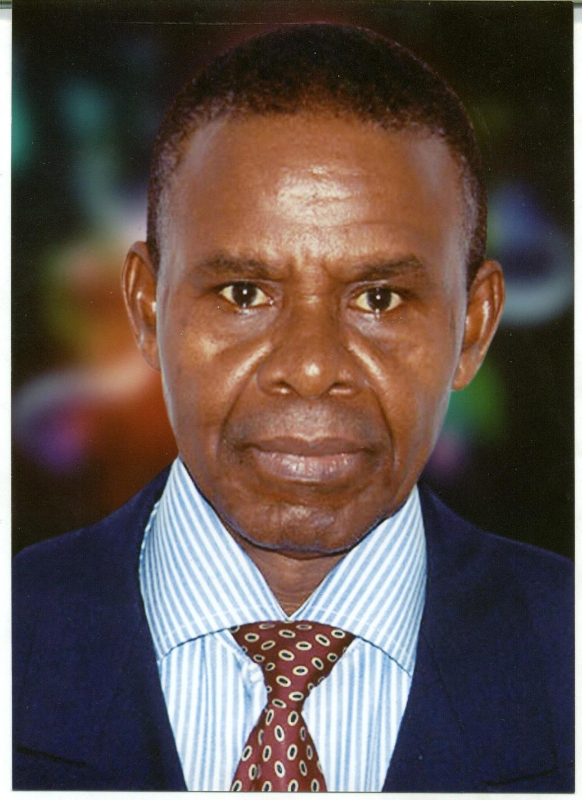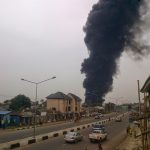
Big City Pollution 
By Chima Nwafo
Since 1974, following a United Nation’s declaration, June 4 has become a platform for global observation of the World Environment Day. And Nigeria was part of the more than 100 countries that celebrated the event. Interestingly, the National Association of Geography and Environmental Management Students,University of Abuja, in cooperation with two not-for profit organisations kick-started the celebration a week earlier: with a “March for Climate Justice”, during which they called on Nigerians to expedite actions against air pollution and climate change for a healthy environment in the country.
This is a welcome change, hoping that the other universities, especially their respective chapters of the association, and even secondary schools in the country, will follow suit. The environmental docility of students and youths in the heavily polluted oil-producing areas remains a cause for concern.
Headlining the yearly observance, EuroNews recalled affirmative action of The Guardian newspaper of UK, which “decided to ban the use of the term ‘climate change’, in exchange for ‘Climate Crisis’, to enhance awareness of the severity of the problems we are facing.” The medium noted that both governments and media outlets worldwide are, at last, beginning to take global warming more seriously, adding: “But enough is not enough. One of the most pressing problems we are confronted with is air pollution, which is why the theme for this year’s World Environment Day is ‘Beat Air Pollution.’” But that is still in far-away Europe and other climes where the people and their governments place premium value on human life and the ecology. We in Africa are yet to appreciate the enormity of the peril.

Could our collective complacency mean that the threat of air pollution and other threats to the environment are less acute in Nigeria, nay Africa? The answer is emphatic no. The list of Africa’s environmental problems and the inability of African countries to cooperate on ecological issues has been captured in several conferences and seminars by activists and media analysts. Yet, a January 2019 World Health Organisation (WHO) statement was emphatic on both the seriousness of the threat of air pollution and its greater devastative impact on Africa and other less developed countries. According to the report, air pollution poses the greatest environmental threat to global health in 2019.
Marking the start of its new five-year strategic plan, the 13th General Programme of Work, “the WHO said that nine out of 10 people breathe polluted air every day, with ambient and household air pollution killing 7 million people prematurely every year. The United Nations public health agency added that the problem is particularly prevalent in low-to-middle-income countries, with these countries representing 90 per cent of deaths due to air pollution.
The organisation explained that countries in Africa and Asia are vulnerable to high volumes of emissions from industry, transport and agriculture, as well as dirty cooking-stoves, generators, and fuels at home. This leaves citizens of those countries particularly prone to suffering air pollution-related diseases such as cancer, strokes, heart and lung disease.”
Talk about vulnerability to high level emissions, of all the sources mentioned, Nigeria ranks highest: most of the vehicles on our roads are tokunbo and un-roadworthy cars and lorries, in a generator-driven economy where dirty stoves and charcoal are still in popular use. This is nation-wide phenomenon, besides the suffocating degree of pollution in the oil-producing areas. These are everyday experiences in both the urban and rural areas on both geographical divides. That is, no region of Nigeria is actually free from air pollution, despite the chilling nonchalant disposition of the public. To them, it is the problem of environmental activists and the governments of the federation. Perhaps most worrisome is the fact that climate change, global warming, or ecological crisis mean little to the Nigerian media. It just manages to report the activity of related civil society groups. That is why news break of oil pollution reported by petroleum production companies make the headlines, but its deadly impact and threat to humans and their immediate environment do not; neither are they considered worthy of investigation.
For example, in October 2016, a spill in Shell’s oilfield discharged crude into Ekole Creeks and Nun River, which adversely affected 18 communities along the waterways. After over a year of no-action on remediation, a group wrote a petition to NOSDRA over the abandoned oil spill site within Shell’s oilfields in Bayelsa. NOSDRA’s response compelled Shell Petroleum Development Company (SPDC) to resume post-spill impact activities in the polluted areas.

“The intervention was a lifeline to the environment as it prevented further degradation of the area polluted by the oil spill and abandoned by the oil firm,” noted the group, while urging urged the NOSDRA teams participating in the exercise to “extend it to the remaining impacted areas of Okoroma clan in Nembe, Brass and Southern Ijaw LGAs of Bayelsa.”
Articulating the need for awareness and personal involvement, a researcher and doctoral student at America’s University of Minnesota, Jennifer Nicklay, posited: “We can benefit from how we manage the environment. Clean water, clean air, and agriculture benefit us, our waterways, and wildlife. We put a value on crop yield, which is all well and good.” Even though our attitude seems to confirm the words of iconic comedian, Zebrudaya, that “dorti a does not kill black man, today many Nigerians are dying from the various environmental related health challenges. Even though it is already a regular feature in the media, they are reported as sicknesses, without any attempt to seek expert opinion on the causes and prevalence of such ailments now. But elsewhere, in the developed world, people care and the story is different. Ironically, Nigerian elites and politicians who can afford it travel out to those countries for medical tourism. The less-privileged, according to the WHO report, suffer and die here ignominiously.
A recent research report published in the European Heart Journal, showed that while air pollution hits the lungs first, its impact via the bloodstream on heart disease and strokes is responsible for twice as many deaths as respiratory diseases. The analysis builds on earlier finding published in September which confirms that the “calculation of 8.8 million early deaths a year from outdoor air pollution around the world, double previous estimates.”

This means that air pollution causes more extra deaths a year than tobacco smoking,” said Prof Thomas Münzel of the University Medical Centre, Mainz,Germany and one of the scientists behind the new study.” He noted: “Smoking is avoidable but air pollution is not.”
*Nwafo, Veteran Copy Editor/Environmental Analyst, can be reached on: [email protected]; +2348029334754.
Share your story or I Witness Reports with us 24/7
via: SMS: +234 (0)9076248001
Whatsapp: +234(0)8072022024, Email: [email protected]
Website: www.gatmash.com
For advert placement, contact us today via email: [email protected] or call our hotlines on Tel: +234(0)8072022024, 08166622444, 09076248001




